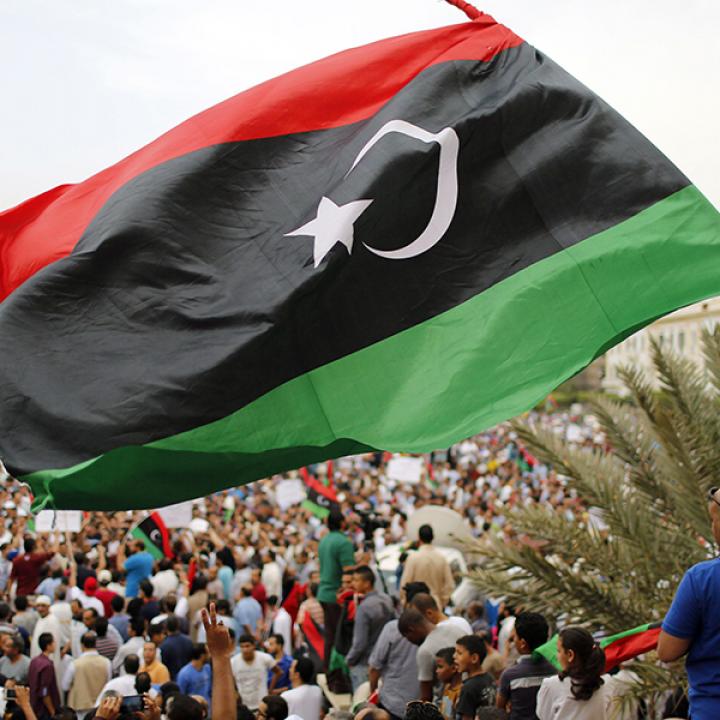
- Policy Analysis
- Articles & Op-Eds
Defining a New Italian Role in Libya and Africa

Half a decade after the 2011 Libyan uprising, the Libyan Eastern Army is fighting against Islamist militants in Benghazi while a unified interim government in Tripoli, guided by Fayez Sarraj and sponsored by the United Nations (UN), is attempting restore order according to the Libyan political agreement of last December. The Libyan Government of National Accord has been promised €100 million in financial support by the European Union. But there is a broader question remaining on the role that Europe in general, and Italy in particular, should play in Libya -- especially due to Italy and Libya’s fraught history.
When Italy unilaterally declared war on the Ottoman Empire in 1911 to conquer the Tripolitania province, which would become the “Italian Libya,” the conflict stimulated Balkan nationalism, a precursor of the First World War. A century later, the Italian government chose against military intervention in Libya—fractured between Tobruk and Tripoli-based factions and tribal and Islamist militias—even as other international actors, including the United States, advocated for air strikes. Italy instead chose to support the Libyan Government of National Accord by renewing its role in Libya as an outside supporter rather than an occupant or active participant.
It is clearly beneficial for Italy to work for diplomacy and cooperation throughout the Mediterranean basin for geographical and historical reasons. Notably, Italy once stood at the center of the multiethnic hub of the Roman Empire, where Normans, Arabs, Turks, Berbers and others immigrated, traded, and made migration the norm before the rise of nation-states and hard borders. Today, the Mediterranean basin has reprised its role as a hub of migration, but the refugee crisis has made the sea a place of death and desperation, with the recently capsized boat and its hundreds of fatalities only the latest instance.
As the Syrian conflict remains intractable, European focus on Libya is necessary to prevent another collapse and a new Libyan refugee crisis. The Italian state and the European Union have both taken steps to develop a solution to this massive humanitarian catastrophe by asking Libya to seal its borders in exchange for help resettling displaced persons and restarting the Libyan economy after the disastrous post-Gadhafi period. Italy, agreeing with the official Egyptian position, does not believe that a military intervention in Libya is the solution. Neither ISIS expansion nor the migration crisis can really be successfully combated by external military efforts.
Rather, legitimacy will only come through strengthening the new Libyan government’s security institutions and the Libyan civil society, with an emphasis on inclusiveness. Outside governments must support to the interim Libyan government’s efforts to return displaced people to their homes and dislodge ISIS in Libya. The government must also support Libyan civil society’s formation of political and social identities, developing community structures from political parties to local NGOs. Moreover, Italy must encourage cultural exchange. For example, the government should reopen the Italian Cultural Institute that was closed along with the Italian embassy in February 2015, as Libyans have requested.
But the empowerment of security institutions and civil society is not enough: without economic development the country will not be able to function properly. Italy is currently one of the foremost members of the EU concerned with economic development, not only for Libya but also the rest of Africa. The Italian government, led by the young reformist former mayor of Florence Matteo Renzi, recently proposed the “Migration Compact” to the EU. This is a project that seeks to support the development of Africa through agreements promoting economic solidarity to combat the poor economic conditions that drive millions of people to migrate to the more prosperous north. Unfortunately, Angela Merkel has already refused the plan outright, despite expressions of interest from a majority of EU representatives, including the president of European Commission Jean-Claude Juncker and president of the European Council Donald Tusk.
This proposition would promote stricter control on migration from the African states, especially Libya, in exchange for European economic aid to develop richer and more stable economies in said countries. It is in some ways similar to the current agreement with the Turkish government. The Migration Compact calls for the creation of a European fund that would provide socially-driven investments in African countries. The Compact would also create “Africa bonds” in the style of Eurobonds – government bonds issued jointly by the nineteen Euro countries. These bonds would be designed to help African partners invest in innovation and development. This would also allow countries to compensate for the costs accrued by adopting the asylum law. Ultimately, economic migration should be based on “entrance quotas” similar to the US, focusing on those who have acquired some preparatory training and have learned the language of the country to which they want to migrate.
If the refugee issue will be solved through a lasting peace in the Middle East and through the recently demonstrated compassion of those like the Pope, then the issue of economically motivated migration will ultimately be solved by stable and democratic governments that have achieved sustainable development. To reach a mutually acceptable political solution for the EU and Africa will take time, but support and cooperation from all sides is the only path that will succeed. We need to start down this path sooner rather than later.
Maurizio Geri is a PhD Candidate and Research Assistant in International Studies at Old Dominion University. This article was originally published on the Fikra website.
Fikra Forum


